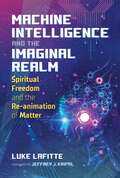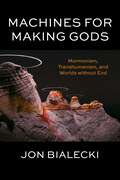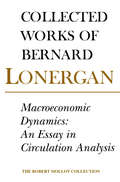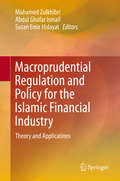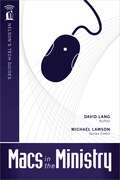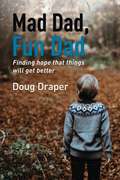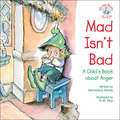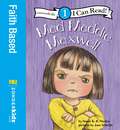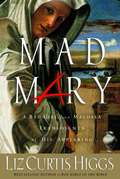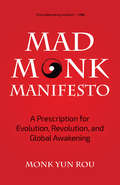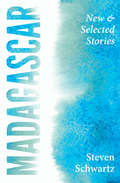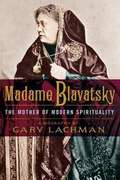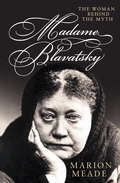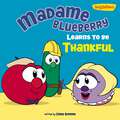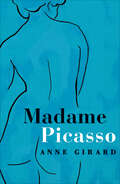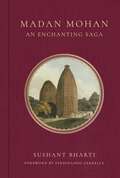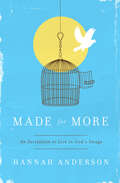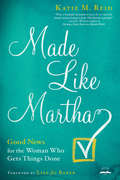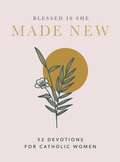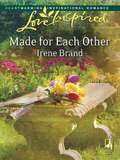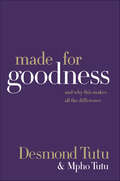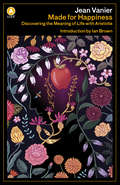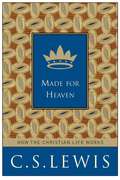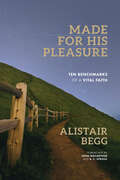- Table View
- List View
Machine Intelligence and the Imaginal Realm: Spiritual Freedom and the Re-animation of Matter
by Luke Lafitte• Explores how we naturally project consciousness onto machines and how this is reflected in human culture, science, artificial intelligence, and literature • Demonstrates a direct connection between consciousness and the history of machines in American history • Looks at the contributions and influence of Grace Hopper, Richard Feynman, Philip K. Dick, Nikola Tesla, Thomas Edison, Elon Musk, David Bohm, Norbert Wiener, and Steve Jobs as well as the Nag Hammadi Gnostic gospels Humans invented and constructed machines to aid them, as far back as the Stone Age. As the machines became more complex, they became extensions of the body and mind, and we naturally began projecting consciousness onto them. As Luke Lafitte shows in detail, although machines complicate the already complicated issue of identity, because they are &“ours&” and &“of us,&” they are part of our spiritual development. In this sweeping exploration of the history of the machine as a tool, as a transpersonal object to assist human activity, and as a transitional artifact between spirits and the humans who interact with them, Lafitte examines the role that machines play in the struggle between &“spiritual man&” and &“mechanical man&” throughout history. He interprets the messages, archetypes, and language of the unconscious in the first popular stories related to mechanical men, and he demonstrates a direct connection between consciousness and the history of machines in American history, specifically between the inventors of these machines and the awakening of our imaginations and our powers of manifestation. He examines the influence of Philip K. Dick, Nikola Tesla, Thomas Edison, Grace Hopper, Richard Feynman, Elon Musk, David Bohm, and others and shows how the Nag Hammadi gospels explain how we can take back our myth and spirit from the machine. Although the term &“mechanical man&” is a catch-all phrase, Lafitte shows that the term is also a meeting ground where extra-dimensional communications between different forms of matter occur. Every machine, android, robot, and cyborg arose from consciousness, and these mechanical men, whether real or fictive, offer us an opportunity to free ourselves from enslavement to materialism and awaken our imaginations to create our own realities.
Machines for Making Gods: Mormonism, Transhumanism, and Worlds without End
by Jon BialeckiThe Mormon faith may seem so different from aspirations to transcend the human through technological means that it is hard to imagine how these two concerns could even exist alongside one another, let alone serve together as the joint impetus for a social movement. Machines for Making Gods investigates the tensions between science and religion through which an imaginative group of young Mormons and ex-Mormons have found new ways of understanding the world.The Mormon Transhumanist Association (MTA) believes that God intended humanity to achieve Mormonism’s promise of theosis through imminent technological advances. Drawing on a nineteenth-century Mormon tradition of religious speculation to reimagine Mormon eschatological hopes as near-future technological possibilities, they envision such current and possible advances as cryonic preservation, computer simulation, and quantum archeology as paving the way for the resurrection of the dead, the creation of worlds without end, and promise of undergoing theosis—of becoming a god. Addressing the role of speculation in the anthropology of religion, Machines for Making Gods undoes debates about secular transhumanism’s relation to religion by highlighting the differences an explicitly religious transhumanism makes.Charting the conflicts and resonances between secular transhumanism and Mormonism, Bialecki shows how religious speculation has opened up imaginative horizons to give birth to new forms of Mormonism, including a particular progressive branch of the faith and even such formations as queer polygamy. The book also reveals how the MTA’s speculative account of God and technology together has helped to forestall some of the social pressure that comes with apostasy in much of the Mormon Intermountain West.A fascinating ethnography of a group with much to say about crucial junctures of modern culture, Machines for Making Gods illustrates how the scientific imagination can be better understood when viewed through anthropological accounts of myth.
Macroeconomic Dynamics: An Essay in Circulation Analysis, Volume 15
by Bernard Lonergan Charles Hefling Jr. Frederick Lawrence Patrick ByrneFew theologians in history have matched Bernard Lonergan's range of learning. Fewer still have written on the "dismal science" of economics. Rooted so solidly in the concerns of this world, economics is not a discipline we associate with the more rarified pursuit of theology. In this long-awaited volume, Lonergan demonstrates the short-sightedness of this view. This companion volume to For A New Political Economy (Collected Works of Bernard Lonergan, Volume 21) continues the work of bringing together the various elements of Lonergan's economic thought. His economic writings span forty years and represent one of the most important intellectual achievements of the twentieth century. They have previously been inaccessible outside of the Lonergan research community as the majority of them have not been formally published, and exist only as a group of unfinished essays and material for courses on economics taught by Lonergan. Lonergan's economic ideas track a different line of thought from that taken by contemporary economists. Macroeconomic Dynamics: An Essay in Circulation Analysis represents the economic thought of Lonergan at the end of his career. His analysis, while taking a fresh look at fundamental variables, breaks from centralist theory and practice towards a radically democratic perspective on surplus income and non-political control, and explores more fully the ideas introduced in For a New Political Economy. This work will be read not only by economists but also by liberation theologians, political theologians, and others inside and outside of religious organizations interested in social justice issues and alternative approaches to economics.
Macroprudential Regulation and Policy for the Islamic Financial Industry
by Muhamed Zulkhibri Abdul Ghafar Ismail Sutan Emir HidayatThis volume aims to discuss thecurrent research, theory, methodology and applications of macropreudentialregulation and policy for the Islamic financial industry. Published incooperation with the Islamic Research and Training Institute (IRTI), this book featurescontributions from a workshop presented in collaboration with the UniversityCollege of Bahrain (UCB) in Manama, Bahrain, aimed to bring together experts inIslamic banking and regulation and financial economics. This resulting booksheds light on how macroprudential policy may be implemented in the Islamicfinancial system, and indicates current challenges and their effects oneconomic growth, financial stability and monetary regulation. Macroprudential policyis increasingly seen as a way of dealing with the different dimensions ofsystemic risk. But many central banks, bank supervisors and regulators havelimited experience with macroprudential tools, particularly in the Islamicfinancial industry. Given the complementarities between monetary policy andfinancial stability, it appears that central banks would always play animportant role in macroprudential policy. But how should macroprudential policybest interact with monetary policy? It is becoming more pressing for the centralbanks to conduct monetary policy in which its conventional banking systemoperates side by side with Islamic banking system. This question has receivedincreasing attention in the research literature but there is much we still needto learn. This is why new insights from research on macroprudential policy -which has gained important impetus in recent years - are so valuable. Featuringcontributions on topics such as macroprudential regulation, policy, tools andinstruments; governance, systematic risk, monetary policy, and bank leverage,the editors provide a collection of comprehensive research covering the mostimportant issues on macroprudential policy and regulation for the Islamicfinancial industry. This volume is expected to be a significant contribution tothe literature in the field of Islamic finance and evaluation of publicpolicies to promote the development for Islamic financial industry. It is alsoserved as a key text for students, academics, researchers, policy-makers in thefield of Islamic finance.
Macs in the Ministry (Nelson's Tech Guides)
by David LangMacs in the Ministry - Your ministry demands your time, energy, creativity, passion and commitment. But you've got a Mac, so you have a tool that can save you time and energy, spark your creativity, and enable you to keep your commitments without losing your passion. Find out how to harness the programs you already have, along with additional resources you may want to consider, to help you in nearly every aspect of your ministry.Part One of this book is about Inspiration: about discovering what's possible. Learn how to use online resources or Bible software to prepare a lesson or sermon. Discover the variety of ways you can present your message to a congregation or audience: using video created in iMovie, photo slide shows prepared in iPhoto, original music recorded in GarageBand, and more elaborate presentations using Keynote or specialized worship software. Learn how you can publish your message to a wider audience: through flyers, handouts, and other print publications; by creating podcasts and vodcasts (video podcasts) and distributing them through iTunes; by creating your own professional-quality CDs and DVDs; by making your videos available through websites like YouTube; or by developing your own great-looking websites using iWeb and Apple's MobileMe service.Once you're pumped about all the exciting ways you can present and publish your message, you'll probably need to enlist some help from others. Use the Mac to get members of your congregation or church youth group participating in your ministry. With so many different ways to use Macs in ministry, there are countless opportunities to get people using their gifts in service to the kingdom.Going one step further, you'll even see how the Mac can be used to meet practical needs. Forget car washes to raise money for youth retreats and mission trips! Why not develop and sell personalized greeting cards, calendars, audio CDs, or video DVDs? How about starting a ministry to train people in the community to do basic video editing, page layout, or web design? With a little creativity, you can use your Mac to minister to people's practical needs as well as to present a polished message.Part Two of this book is about perspiration: about actually making these things happen. Here you'll find a series of projects that will show you how to do all the things you're now inspired to do. Get step-by-step instructions for creating an iMovie, developing slide shows and print projects in iPhoto, recording and publishing podcasts, producing a DVD, and developing a web-site in iWeb. See what you can do using other applications like Pages, Keynote, Bible study software, and worship presentation software. Where Part One will get your wheels turning, Part Two will actually get you moving!
Mad Dad, Fun Dad: Finding Hope that Things will Get Better
by Doug DraperFrom an early age, Ben Baker knows that “when dad is mad, someone is going to get hurt.” He sees it when his father bashes his mother in the head with a shotgun and experiences it through frequent beatings with brooms, rakes or whatever tool is handy. The physical pain is matched by the emotional damage of his father repeatedly calling him “the stupidest and laziest boy in the world.” This mistreatment takes place while working on the family farm and at his father’s service station in a small town located on the foothills of Utah’s Wasatch Mountains. As the smallest boy in his class, Ben also faces abuse at school because bullies find him to be an easy target for punches, kicks and insults. He deals with the cruelty by keeping his back to the wall and doing whatever he can to dodge the bullies. <P><P> His run-and-hide approach changes when an ex-convict, Derek Dean, takes a job pumping gas at his father’s service station. Derek teaches Ben how to deliver the pain instead of being the one who feels it. Ben applies what he learns and lashes out with unbridled fury. He uses a steel pipe to humiliate a pair of bigger opponents and knocks out another bully with a viscous kick to the head. Besides getting him in trouble at school, Ben worries that his anger-fueled actions will lead him to become like his father. <P>His mind becomes a battlefield, with a wish to live peacefully fighting against a ruthless desire to punish anyone who messes with him. Ben’s relationship with Derek shifts from friend to foe when he catches Derek stealing his father’s truck and tools. After Derek spends five years in prison for theft, he returns to Alma seeking revenge. While Ben is on a camping trip with his Boy Scout troop, Derek and two friends confront him and promise to make Ben pay for his role in sending Derek back to prison. With this threat weighting heavily on his mind, Ben reacts with violence to a cruel prank pulled on him by his fellow scouts and finds himself in trouble again. Frustrated, he decides to escape all his problems by running away and living off the land. Before launching his secret plan, Ben chats with his scoutmaster who encourages Ben to rely on God to help him deal with his challenges. The scoutmaster also promises to pray for Ben. When he runs away, Ben soon needs all the help he can get. Once again, he crosses paths with Derek and a chase through the mountains begins, with Ben leading the vengeful ex-convict on an overnight hike during a powerful snowstorm. Instead of having to merely face punishment for his angry outburst at the scout camp, Ben’s attempt to escape brings him to the point of death. While frightening and painful, this battle for survival becomes a turning point in Ben’s life. It plants a seed of hope in him that things will get better. Ben’s struggles continue, but he moves forward equipped with new strength. His story provides a compelling example of the power of faith and prayer in changing lives. For Ben, it means breaking the cycle of violence, replacing despair with hope and finding peace in a combative world.
Mad Isn't Bad
by R. W. Alley Michaelene MundyYou can be angry--and still be good. That's normal. Through understanding what anger feels like and what triggers it, we can learn and teach healthy ways to handle it. Mad Isn't Bad offers kids a positive and honest view of anger--and what to do with it.
Mad Maddie Maxwell: Biblical Values, Level 1 (I Can Read! #Level 1)
by Stacie K.B. MaslynMaddie’s jump rope is missing. When she doesn’t find it in all the usual places, she gets angry. She blames each member of her family in turn. Through familiar rhyme and repetition, simple text, and delightful illustrations, this level-one I Can Read Book provides support for the earliest readers.
Mad Mary: A Bad Girl from Magdala, Transformed at His Appearing
by Liz Curtis HiggsCome meet the genuine Mary Magdalene of the Bible -- not the scarlet-draped legend -- and follow her one-of-a-kind story of deliverance and dedication, despair and declaration. Like my previous "Bad Girls" books, "Mad Mary" begins with the fictional journey of Mary Margaret Delaney, a bad woman-or was it madwoman? -- adrift in contemporary Chicago, desperate for someone to save her from herself. Once Mary Delaney's story has prepared our hearts for learning, we'll leave the Windy City and go verse by verse through Mary of Magdala's ancient biblical tale, tossing aside modern misconceptions as we embrace the real Mary M. Prepare to be amazed by this eye-opening sister who was transformed twice when You-Know-Who showed up and spoke her name.
Mad Monk Manifesto: A Prescription for Evolution, Revolution, and Global Awakening
by Yun RouWinner of Both Gold & Silver 2018 Nautilus Book Award and #1 New Release in Taoism and Tao Te ChingChange Yourself, Change The WorldFind answers. It’s easy to get outraged by world events, frustrated by our own personal battles, and disenfranchised from government and leadership. Born of moral indignation, informed by decades of study, and seasoned by a life of devoted self-cultivation, Monk Yun Rou’s Mad Monk Manifesto has answers, personal prescriptions, and calls to social and political action in one powerful book.Change the world by changing ourselves. Based on ancient Chinese wisdom such as Lao Tzu’s Tao Te Ching, Mad Monk Manifesto is part tour guide to consciousness, part recipe for personal development, part prescription for environmental salvation, and part handbook for social change.Wise advice for the awakened life. As ripples move away from a stone dropped into a pond, Mad Monk Manifesto begins with our personal lives, discussing diet, exercise, meditation, and mind/body practice. Then it expands to our public environment, describing what we can do to improve our community, government, and the world. Full of everything from advice for a healthy, conscious lifestyle to actions we can take to enhance the lives of friends, family, coworkers, and community members; Mad Monk Manifesto highlights spirituality and service. In addition, Monk Yun Rou encourages everyone to engage in the nature that surrounds them, showing how environmentalism can take place in daily life.Mad Monk Manifesto is precisely what the world needs at a time of unprecedented environmental disasters, international instability, and divisive and unreliable leadership. After reading this book, you will learn:How to relax, rectify, and rebalance lifeHow to bolster the community and deepen cultureHow to effect positive change in commerce, government, power, and the environmentMad Monk Manifesto is for readers of Alan Watts, Eckhart Tolle, and Change Your Thoughts—Change Your Life by Dr. Wayne W. Dyer.
Madagascar: New and Selected Stories
by Steven SchwartzFrom the winner of the Nelson Algren Award for Short Fiction comes this indispensable collection spanning nearly four decades of artistic mastery. In these compelling, deftly crafted narratives about fathers and sons, loss and separation, sorrow, comic happenstance, and the vagaries of romantic and familial love, Steven Schwartz offers a resonating testament to the depth and promise of human connection.
Madame Blavatsky
by Gary LachmanA thoughtful biography of one of the most polarizing pioneers of alternative spirituality, the occult-mystic Helena Petrovna Blavatsky. Pioneer. Visionary. Provocateur. Madame Helena Petrovna Blavatsky—mystic, occult writer, child of Russian aristocrats, spiritual seeker who traveled five continents, and founder (with Henry Steel Olcott) of the Theosophical Society—is still being hailed as an icon and scorned as a fraud more than 120 years after her death. But despite perennial interest in her life, writings, and philosophy, no single biography has examined the controversy and legacy of this influential thinker who helped define modern alternative spirituality—until now. Gary Lachman, the acclaimed spiritual biographer behind volumes such as Rudolf Steiner and Jung the Mystic, brings us an in-depth look at Blavatsky, objectively exploring her unique and singular contributions toward introducing Eastern and esoteric spiritual ideas to the West during the nineteenth century, as well as the controversies that continue to color the discussions of her life and work. .
Madame Blavatsky: The Woman Behind the Myth
by Marion MeadeThe life and times of Helena Blavatsky, the controversial religious guru who cofounded the Theosophical Society and kick-started the New Age movement. Recklessly brilliant, Helena Petrovna Blavatsky scandalized her 19th century world with a controversial new religion that tried to synthesize Eastern and Western philosophies. If her contemporaries saw her as a freak, a charlatan, and a snake oil salesman, she viewed herself as a special person born for great things. She firmly believed that it was her destiny to enlighten the world. Rebelliously breaking conventions, she was the antithesis of a pious religious leader. She cursed, smoked, overate, and needed to airbrush out certain inconvenient facts, like husbands, lovers, and a child. Marion Meade digs deep into Madame Blavatsky&’s life from her birth in Russia among the aristocracy to a penniless exile in Europe, across the Atlantic to New York where she became the first Russian woman naturalized as an American citizen, and finally moving on to India where she established the international headquarters of the Theosophical Society in 1882. As she chased from continent to continent, she left in her aftermath a trail of enthralled followers and the ideas of Theosophy that endure to this day. While dismissed as a female messiah, her efforts laid the groundwork for the New Age movement, which sought to reconcile Eastern traditions with Western occultism. Her teachings entered the mainstream by creating new respect for the cultures and religions of the East—for Buddhism and Hinduism—and interest in meditation, yoga, gurus, and reincarnation. Madame Blavatsky was one of a kind. Here is her richly bizarre story told with compassion, insight, and an attempt to plumb the truth behind those astonishing accomplishments.
Madame Blueberry Learns to Be Thankful / VeggieTales (Big Idea Books / VeggieTales)
by Cindy KenneyPresented in the 8x8 softcover format, complete with stickers for additional fun, VeggieTales’ Madame Blueberry Learns to Be Thankful helps little ones see how important it is to be thankful for what they have. When Madame Blueberry needs to begin rebuilding her tree house, her friends Bob and Larry come to help. But when they begin to talk about getting more and more things that might make the job easier, she reminds them that they should be happy with what they have.
Madame Picasso
by Anne Girard“[An] intriguing story of love and loss. . . . Girard creates a wonderful period piece [and] . . . successfully captures the essence of an iconic figure.” —Publishers WeeklyWhen Eva Gouel moves to Paris from the countryside, she is full of ambition and dreams of stardom. Though young and inexperienced, she manages to find work as a costumer at the famous Moulin Rouge, and it is here that she first catches the attention of Pablo Picasso, a rising star in the art world.A brilliant but eccentric artist, Picasso sets his sights on Eva, and Eva can’t help but be drawn into his web. But what starts as a torrid affair soon evolves into what will become the first great love of Picasso’s life.With sparkling insight and passion, Madame Picasso introduces us to a dazzling heroine, taking us from the salon of Gertrude Stein to the glamorous Moulin Rouge and inside the studio and heart of one of the most enigmatic and iconic artists of the twentieth century.Novelist Anne Girard brings to life the mesmerizing and untold story of Eva Gouel, the unforgettable woman who stole the heart of the greatest artist of our time.“Girard . . . ably marries history, art, and romance here as Eva remains broadly rendered and famous figures shine.” —Booklist“Gripping. . . . Written with . . . heartfelt passion.” —Pittsburgh Post-Gazette“A wonderful portrait of the complicated relationship between art, passion and love from a woman’s viewpoint. Girard is a talented storyteller and historian, drawing readers into the world in which her characters live.” —RT Book Reviews
Madan Mohan: An Enchanting Saga
by Sushant BhartiConservation Architect and Researcher Sushant Bharti highlights the significance of the Madan Mohan, an ancient and important temple in Vrindavan, India that has had a prominent impact both locally and globally throughout its history. The text includes a captivating portrayal of the temple both at home and in the Indian diaspora, a tribute to the attractive, ever enchanting nature of the structure and its spiritual potency.The establishment of Gaudiya Vaishnavas in the Braj region catalysed a novel movement centered around the devotion to Radha and Krishna. This movement, in turn, spurred construction of the Madan Mohan, one of the most significant and prominent temples in the area during the Mughal reign. In the late 16th and early 17th centuries, each temple emerged as a distinct exemple of Mughal artistry, showcasing a seamless integration of diverse architectural components and novel experimentation. The Madan Mohan temple stands as a remarkable testament to the confluence of social, economic, and political forces that transcended regional boundaries during the zenith of Mughal dominance.
Made For More: An Invitation to Live in God's Image
by Hannah AndersonWho are you, really?In an uncertain world, we crave the security of knowing exactly who we are and where we belong. But too often as women, we try to find this safety in our roles and relationships, our professional accomplishments, or our picture-perfect homes. And as we do, our souls shrink smaller and smaller. It's because these things aren't made to hold us. In Made for More, Hannah Anderson invites you to re-imagine yourself, not simply as a set of roles and categories, but as a person destined to live in the fullness of God Himself. Starting with our first identity as image bearers, Hannah shows how Jesus Christ makes us people who can reflect His nature through our unique callings. She also explores how these deeper truths affect the practical realities that we face as women—how does being an image bearer shape our pursuit of education, our work, and even our desire for holistic lives? Because you are made in God&’s image, you will only ever know yourself—only ever be yourself—as you find your identity in Him. Find it now.
Made For More: An Invitation to Live in God's Image
by Hannah AndersonWho are you, really?In an uncertain world, we crave the security of knowing exactly who we are and where we belong. But too often as women, we try to find this safety in our roles and relationships, our professional accomplishments, or our picture-perfect homes. And as we do, our souls shrink smaller and smaller. It's because these things aren't made to hold us. In Made for More, Hannah Anderson invites you to re-imagine yourself, not simply as a set of roles and categories, but as a person destined to live in the fullness of God Himself. Starting with our first identity as image bearers, Hannah shows how Jesus Christ makes us people who can reflect His nature through our unique callings. She also explores how these deeper truths affect the practical realities that we face as women—how does being an image bearer shape our pursuit of education, our work, and even our desire for holistic lives? Because you are made in God&’s image, you will only ever know yourself—only ever be yourself—as you find your identity in Him. Find it now.
Made Like Martha: Good News for the Woman Who Gets Things Done
by Katie M. Reid Lisa-Jo BakerAn invitation for overachievers to discover what it means to rest as God's daughters without compromising their God-given design as doers.Though she didn't sit at Jesus's feet like her sister Mary, biblical Martha was loved just as she was--and you are too. This practical resource invites modern-day Marthas to sit down spiritually as they exchange try-hard striving for hope-filled freedom without abandoning their doer's heart in the process. Doers need to be affirmed in their innate design to do rather than sit, yet also be reminded that they don't have to overdo it in order to be worthy. This book is not an exhortation to add or subtract things off your to-do list, but it is an invitation to embrace the "good" of the Good News. Here is an offer to step into your position as a daughter of God and to enjoy life as a doer.
Made New: 52 Devotions for Catholic Women
by Blessed Is SheHow would your life change if you were certain of your identity? If you could know that Someone loves you, sees you, and wants to be close to you--just as you are? In this beautifully designed weekly devotional for Catholic women, you're invited to soak in God's Word to embrace your identity as a beloved woman made in God's image.Authored by Blessed Is She, a popular Catholic online community for women, Made New walks with rich reflections through the Gospels, substantive Scripture for prayer through Lectio Divina, and prompts for spiritual growth. Over the course of 52 weeks, you'll uncover:how deeply God knows who you are and loves who you're becoming.why you belong to God's family.what it means that your true identity is as God's beloved.how your belief in God's love affects your identity.how you are becoming more yourself as you follow God's plan for your life.Made New is a thoughtful gift for the new year, birthdays, holidays, or for any Catholic woman who wants a stronger sense of self-worth, deeper peace in her identity, and a richer relationship with the God who loves her. Each devotional entry includes:a Scripture referencea devotion written by a Blessed Is She authorprompts for reflectiondesigned full-color pages with original artThis devotional will draw you into relationship with a God who is loving, mighty, and committed to your flourishing, a God who advocates for you, a God who delights when you come to Him. Be made new as you journey through a year of thought-provoking devotions, inspiring personal stories, and heartfelt prayers.
Made for Each Other
by Irene BrandSingle motherdoesn'tseek loveRaising a teenager kept widow Aimee Blake too busy for a relationship. Or so she said. Her daughter was trying--with all her rebellious might--to cut the apron strings. So Aimee took some "me time. " She attended a singles group and met a handsome counselor as not interested in romance as she was. With his painful family past and a failed engagement Jacob Mallory was a one-date kind of man. These days he committed only to his work. Problem was Aimee had discovered that she and Jacob were made for each other. . .
Made for Goodness: And Why This Makes All the Difference
by Mpho Tutu Archbishop Desmond Tutu"We are made for goodness. We are made for love. We are made for friendliness. We are made for togetherness."—Desmond Tutu In this personal and inspirational book, the late beloved Nobel Prize-winner and humanitarian shares the secret of joy and hope in the face of life’s difficulties.Archbishop Desmond Tutu witnessed some of the world’s darkest moments, for decades fighting the racist government policy of apartheid and since then being an ambassador of peace amidst political, diplomatic, and natural disasters. Yet people find him and his work joyful and hopeful. In Made for Goodness, Tutu shares his source of strength and optimism.Written with his daughter, Mpho, who is also an ordained Anglican minister, Tutu argues that God has made us for goodness, and when we simply start walking in the direction of this calling, God is there to meet us, encourage us, embrace us. God has made the world as a grand theater for us to work out this call to goodness; it is up to us to live up to this calling, but God is there to help us every step of the way. So, tackling our worst problems takes on new meaning and is bostered with hope and the expectation that that is exactly where God will show up. Father and daughter offer an inspiring message of hope that will transform readers into activists for change and blessing.
Made for Happiness: Discovering the Meaning of Life with Aristotle
by Jean VanierThis bestselling work is an uplifting and practical look at philosophy and how it can be applied in our everyday lives from the author of the international bestseller, Becoming Human.In Made for Happiness, Jean Vanier examines the basis for modern moral philosophy and its role in our lives today. Having discovered through his work with the intellectually disabled the degree to which our society is divided, and our values misplaced, Vanier invites us to read with fresh eyes theories of happiness written 2,400 years ago.The book follows the links between psychology, spirituality, and morality: psychology helps us face our fears and limitations; spirituality gives us strength; and morality helps us to choose the best actions, those that will make us happier, and thus more human. The combination of these paths to knowledge and wisdom gives meaning to our lives and allows us to make the best use of our freedom on our way to happiness.
Made for Heaven
by C. S. LewisWhy We Still Haven't Found What We're Looking ForWe long for heaven, and we will never feel fully at home until we get there. This keen insight into our souls pervades the writings of C. S. Lewis. From his Chronicles of Narnia to Mere Christianity, Lewis's writings continually return to the theme of heaven as our true home, the land we have been searching for our whole lives, a place where all is finally made right and that all the joys in this life point to. With selections from The Weight of Glory, The Great Divorce, and The Problem of Pain, this collection includes some of Lewis's most beautiful and profound writing on heaven, revealing how our destinies transform every aspect of our lives.
Made for His Pleasure: Ten Benchmarks of a Vital Faith
by Alistair BeggAre you living for God's pleasure or for your own?Pleasing God is not a matter of personal choice, but an imperative that must be taken seriously. In a world of self, we must give way to the priority of God if we want to experience His joy. In this popular book, Alistair identifies ten benchmarks from Scripture that will prove invaluable as you seek to live a life that is pleasing to God. His clear, personal message will challenge and revitalize your faith.Spiritual fitness is not a series of straight, 100-yard sprints. Rather, it&’s a lifelong cross-country run of endurance and perseverance. The life that is truly fulfilling gives back to God the talents and abilities He has given us to be used for His glory. "Delightful, insightful teaching on God's Word" — Max Lucado"Alistair compels us clearly and biblically to know the joy of pleasing God in our relationships, successes and failures, and other strategic aspects of our lives." — Joseph M. Stowell
